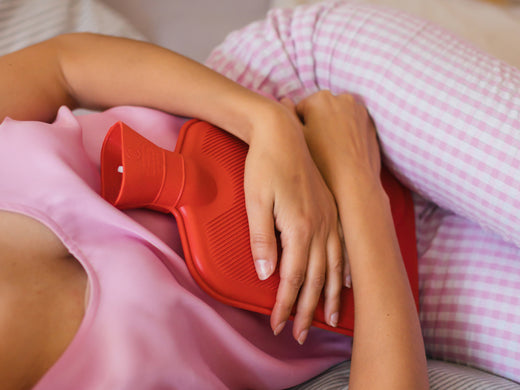Women are more likely to develop anemia than men, and a significant contributing factor is the menstrual cycle. Dealing with periods is no small feat; they can bring about a range of challenges, from pain and discomfort to nausea. But beyond these immediate concerns, there's a deeper health issue at play: iron-deficiency anemia, which can emerge from menstrual bleeding and lead to further complications.
It's important to clarify, though, that not every woman will experience anemia as a result of her period. This risk primarily concerns those with prolonged or particularly heavy menstrual bleeding, as well as individuals starting with lower iron reserves. In this blog, we'll delve into how menstrual cycles can elevate the risk of anemia, highlight the symptoms to watch for, and explore strategies for enhancing your health in the face of this challenge.
What Is Anemia and Why Should You Care?
Anemia is a condition characterized by a deficiency in the number or quality of red blood cells in the body. These cells are responsible for carrying oxygen to the body's tissues, meaning that anemia can lead to a shortage of oxygen in vital organs. Women are particularly susceptible to iron-deficiency anemia due to blood loss during menstruation and the body's increased iron requirements during pregnancy.
How Can Your Period Lead to Anemia?
The menstrual cycle, while a natural and essential part of a woman's reproductive system, can unfortunately also be a source of health concerns, particularly when it comes to iron deficiency and subsequently, anemia. This is especially true for those who experience heavy menstrual bleeding, known medically as menorrhagia, or prolonged periods.
During each cycle, a woman typically loses about 1 mg of iron through normal menstrual blood loss; however, this amount can increase significantly in cases of excessive bleeding. It's estimated that a single menstrual cycle can lead to the loss of more than 80 milliliters of blood for those experiencing heavy periods, with the potential for even greater losses. Considering that each milliliter of blood contains about 0.5 milligrams of iron, the cumulative effect over time can be substantial, leading to a notable depletion of the body's iron stores.
For women with menorrhagia, the risk of developing iron-deficiency anemia is particularly high due to the excessive blood and iron loss experienced during each cycle. Iron-deficiency anemia occurs when the body doesn't have enough iron to produce hemoglobin, the protein in red blood cells that carries oxygen throughout the body.
What Are the Signs of Anemia During Your Period?
Recognizing the signs of anemia is the first step towards addressing and managing the condition. Symptoms may include:
- Fatigue and physical weakness
- Lightheadedness and dizziness
- Pale or yellowish skin
- Shortness of breath
- Rapid heart rate
- Headaches and chest pains
- Cold hands and feet
If you're experiencing any of these symptoms during your period, it could be an indication that your hemoglobin levels are lower than they should be.
How Much Iron Do You Really Need?
The U.S. Department of Agriculture recommends that women aged 19 to 50 consume 18 mg of iron daily, while men and older women require only about 8 mg. The reason for this disparity is primarily the iron loss experienced during menstruation. Ensuring adequate iron intake is essential for preventing anemia and maintaining healthy hemoglobin levels.
Can Diet Help Prevent Anemia Symptoms During Your Period?
Diet plays a pivotal role in managing and preventing anemia. Consuming iron-rich foods before and during your period can help maintain your hemoglobin levels even as you experience blood loss. For detailed guidance on which foods to include in your diet, refer to our comprehensive blog on what to eat if you're anemic.
It's important to note that the type of iron found in plant-based foods (non-heme iron) is not absorbed as efficiently by the body as the heme iron present in animal products. Vegans and vegetarians should ensure they consume sufficient vitamin C to enhance the absorption of nonheme iron.
When Should You Consult a Doctor?
If adjusting your diet does not alleviate symptoms or if you suspect you might be anemic, it's crucial to consult a healthcare professional. They can provide a definitive diagnosis and recommend treatment options, such as iron supplements, to address the deficiency.
How Can AnemoCheck Mobile Assist in Managing Anemia?
In today's digital age, technology offers innovative solutions for health management. AnemoCheck Mobile is a groundbreaking app that allows users to estimate their hemoglobin levels with a simple fingernail selfie. While it cannot replace professional medical advice, AnemoCheck can serve as a valuable tool that helps you identify potential issues early on.
Click here to download the app via the iOS or Android app stores and take a proactive step towards managing your menstrual health.
Addressing anemia, especially when related to menstrual health, requires awareness, proper nutrition, and sometimes technological assistance. By understanding how anemia affects periods and taking steps to prevent it, women can safeguard their health and improve their quality of life.






Leave a comment
This site is protected by hCaptcha and the hCaptcha Privacy Policy and Terms of Service apply.